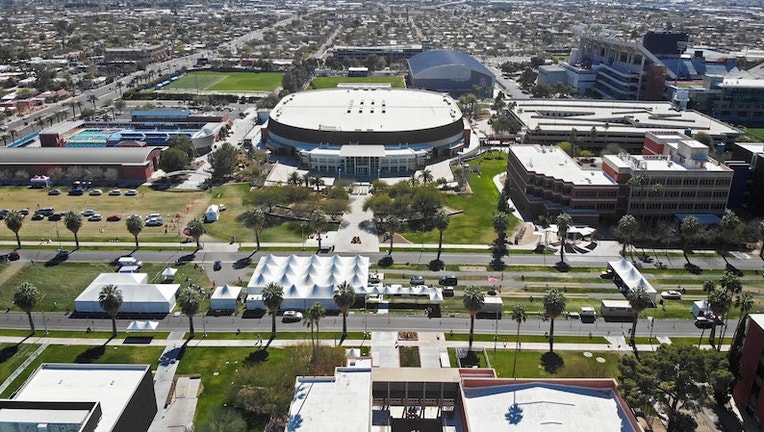COVID-19 vaccination site planned for University of Arizona as state surpasses 1 million doses

The University of Arizona (Office of Governor Doug Ducey)
TUCSON, Ariz. - Arizona will expand an existing COVID-19 vaccination site on the University of Arizona campus in central Tucson and convert it into a state site with higher capacity for administering shots, state officials announced Feb. 10.
The site will be the third state-run site and the first in metro Tucson, where Pima County already has a network of distribution points.
The new state site will be a partnership between the state, the university and the county Health Department, Gov. Doug Ducey and the state Department of Health Services said in a statement.
State and county officials have said they have the capacity to administer many more vaccinations but need the federal government to provide more doses.
RELATED: Some fear vaccination efforts are leaving ethnic minorities behind
"The demand for vaccine doses is high, and Arizonans have made it clear they want it. We are working hard to secure more doses from the federal government and partner with private and public organizations to get the vaccine out and protect Arizonans," Ducey said in the statement.
The transition of the university site to a state site will begin with appointments starting on Feb. 18 and registration for those appointments will begin on Feb, 16, the statement said.
University President Bobby Robbins said the institution welcomes "the opportunity to provide the same service to Southern Arizona as a 24/7 vaccination site for the state."
The state opened its round the clock vaccination site at State Farm Stadium in Glendale on Jan. 11 and a daytime-hours site near Phoenix Municipal Stadium on Feb. 1.
On Wednesday, Ducey announced the state reached a milestone by administering its one-millionth COVID-19 dose.
"We’ve reached a major milestone with our one-millionth dose," Ducey said in a statement. "The dedication and hard work of many made this accomplishment possible. Nurses, doctors, health technicians, support staff, volunteers — to each and every one of you, thank you."
President Joe Biden and Vice President Kamala Harris took a virtual tour of the State Farm Stadium site on Monday as part of the administration’s planning for increased vaccination capacity nationwide.
Neither Biden nor Harris addressed Ducey’s request to increase Arizona’s weekly allotment of the vaccine. The state’s congressional delegation also has asked the administration for more shots for Arizona.

Latest coronavirus numbers in Arizona - 2/10/21
FOX 10's Renee Nelson has the latest COVID-19 data from the Arizona Dept. of Health Services after 176 additional deaths were reported on Feb. 10.
The state on Wednesday reported 1,997 additional known COVID-19 cases and 176 deaths, increasing the state’s pandemic totals to 789,245 cases and 14,462 deaths.
The number of hospitalized COVID-19 patients continued to drop, with 2,589 occupying inpatient beds as of Tuesday. That’s about half of the pandemic high of 5,082 on Jan. 11, according to the state’s coronavirus dashboard.
Meanwhile, rolling seven-day averages of new daily cases and daily deaths both decreased over the past two weeks, according to data from The COVID Tracking Project.
In order to protect yourself from a possible infection, the CDC recommends:
- Avoid close contact with people who are sick.
- Avoid touching your eyes, nose, and mouth.
- Stay home when you are sick.
- Cover your cough or sneeze with a tissue, then throw the tissue in the trash.
- Clean and disinfect frequently touched objects and surfaces using a regular household cleaning spray or wipe.
- Cover your mouth and nose with a cloth face cover when around others
- Wash your hands often with soap and water for at least 20 seconds, especially after going to the bathroom; before eating; and after blowing your nose, coughing, or sneezing.
- Monitor your health daily
RELATED:
- Coronavirus in Arizona: Latest case numbers
- MORE: How to sign up and schedule a COVID-19 vaccine appointment
- MORE: Maricopa County COVID-19 vaccine status updates
- MORE: Arizona Dept. of Health COVID-19 vaccine prioritization
MAP: Worldwide interactive Coronavirus case data
MAP: Arizona Coronavirus cases by zip code
FULL COVERAGE: fox10phoenix.com/coronavirus
CDC: How coronavirus spreads, symptoms, prevention, treatment, FAQ
Arizona COVID-19 resources, FAQ: azdhs.gov/coronavirus
On CoronavirusNOW.com, you'll find extensive coverage about COVID-19, including breaking news from around the country, exclusive interviews with health officials, and informative content from a variety of public health resources.
Symptoms for coronavirus COVID-19 include fever, coughing, and shortness of breath. These, of course, are similar to the common cold and flu.
Expect a common cold to start out with a sore or scratchy throat, cough, runny and/or stuffy nose. Flu symptoms are more intense and usually come on suddenly, and can include a high fever.
Symptoms of COVID-19 may appear more slowly. They usually include fever, a dry cough and noticeable shortness of breath, according to the World Health Organization. A minority of cases develop pneumonia, and the disease is especially worrisome for the elderly and those with other medical problems such as high blood pressure, obesity, diabetes or heart conditions.
RELATED: Is it the flu, a cold or COVID-19? Different viruses present similar symptoms
To protect yourself, wash your hands well and often, keep them away from your face, and avoid crowds and standing close to people.
And if you do find yourself showing any of these flu or coronavirus symptoms - don't go straight to your doctor's office. That just risks making more people sick, officials urge. Call ahead, and ask if you need to be seen and where.
Get breaking news alerts in the FREE FOX 10 News app. Download for Apple iOS or Android.


